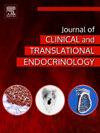Cell division cycle 20 promotes tumor progression and predicts poor clinical outcome in childhood and adult adrenocortical carcinoma
IF 3.3
Q1 ENDOCRINOLOGY & METABOLISM
Journal of Clinical and Translational Endocrinology
Pub Date : 2025-07-02
DOI:10.1016/j.jcte.2025.100406
引用次数: 0
Abstract
Background
Adrenocortical carcinoma (ACC) is an uncommon and highly aggressive tumor with a grim prognosis. Numerous investigations have elucidated a close association between the dysregulated expression of multiple genes within tumors and the initiation as well as progression of neoplasms. These dysregulated genes not only exert pivotal roles in tumorigenesis but also harbor significant potential as prognostic biomarkers.
Methods
This study utilized transcriptomic data from public databases of ACC and normal tissue samples to screen for differentially expressed genes (DEGs). Subsequently, univariate Cox regression and receiver operating characteristic (ROC) curve were employed to identify potential prognostic biomarkers for ACC. Immunohistochemistry and in vitro cell experiments were conducted to validate the expression and potential functions of Cell division cycle 20 (CDC20) in ACC cells. Additionally, we analyzed the relationship between CDC20 and CD8+ T cells, immunotherapy response, somatic mutations, and copy number variations.
Results
CDC20 has emerged as an independent adverse prognostic factor in ACC, with significantly elevated expression levels. In vitro cell experiments have demonstrated that downregulation of CDC20 expression suppresses proliferation and migration of ACC cells. Notably, our study has identified CDC20 expression as most closely associated with TP53 mutation. Additionally, CDC20 expression levels exhibit a negative correlation with infiltration of CD8+ T cells. Patients with low CDC20 expression may show improved response to anti-PD-1 immunotherapy.
Conclusion
CDC20 serves as a reliable and robust biomarker in ACC, playing a crucial role in predicting survival outcomes and assessing immunotherapy response in adult and childhood ACC patients.
细胞分裂周期20促进肿瘤进展并预测儿童和成人肾上腺皮质癌的不良临床预后
背景肾上腺皮质癌(ACC)是一种罕见的高侵袭性肿瘤,预后恶劣。许多研究已经阐明了肿瘤内多种基因表达失调与肿瘤的发生和发展之间的密切联系。这些失调基因不仅在肿瘤发生中发挥关键作用,而且作为预后生物标志物具有重要的潜力。方法利用ACC公共数据库和正常组织样本的转录组学数据筛选差异表达基因(DEGs)。随后,采用单变量Cox回归和受试者工作特征(ROC)曲线来确定ACC的潜在预后生物标志物。通过免疫组织化学和体外细胞实验验证细胞分裂周期20 (CDC20)在ACC细胞中的表达及其潜在功能。此外,我们分析了CDC20和CD8+ T细胞、免疫治疗反应、体细胞突变和拷贝数变化之间的关系。结果scdc20已成为ACC中独立的不良预后因素,其表达水平显著升高。体外细胞实验表明,下调CDC20表达可抑制ACC细胞的增殖和迁移。值得注意的是,我们的研究已经确定CDC20表达与TP53突变最密切相关。此外,CDC20表达水平与CD8+ T细胞浸润呈负相关。低CDC20表达的患者可能对抗pd -1免疫治疗有更好的反应。结论cdc20是一种可靠的ACC生物标志物,在预测成人和儿童ACC患者的生存结局和评估免疫治疗反应中起着至关重要的作用。
本文章由计算机程序翻译,如有差异,请以英文原文为准。
求助全文
约1分钟内获得全文
求助全文
来源期刊

Journal of Clinical and Translational Endocrinology
ENDOCRINOLOGY & METABOLISM-
CiteScore
6.10
自引率
0.00%
发文量
24
审稿时长
16 weeks
 求助内容:
求助内容: 应助结果提醒方式:
应助结果提醒方式:


